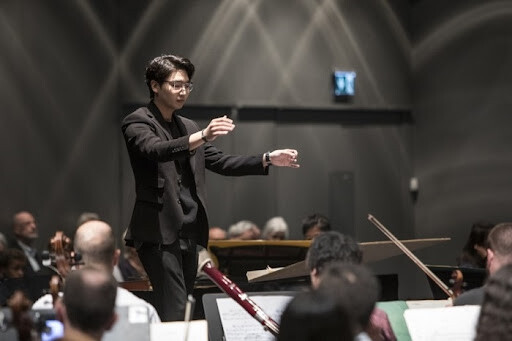
Choi Jaehyuk, a 30-year-old conductor and composer, is shaking up the classical music scene with his innovative and experimental approach. Leading the Ensemble Blanc, a group of like-minded musicians from the Juilliard School, Choi has been challenging traditional interpretations and pushing the boundaries of classical music.
At a recent BBC Proms Korea concert in Seoul, Choi and his ensemble presented a truly unique performance. The concert opened with a haunting rendition of Luciano Berio's "Sequenza V" for trombone, featuring a red-suited pierrot playing the instrument with a raw, almost mournful intensity. Subsequent pieces included Schubert's "Serious Joke," where the musicians wore sensors that transformed their movements into electronic sounds, and Mozart's Serenade No. 10, performed from the empty second-floor balcony.
Choi's approach is characterized by a desire to create a "blank canvas" for the audience, where preconceived notions about classical music are challenged. "I want both newcomers and experts to approach the music with an open mind," he says. This was evident in his own composition, "Nocturne III," which was premiered at the concert. Far from the serene and nocturnal imagery typically associated with nocturnes, Choi's piece was a vibrant and urban soundscape, reflecting his experiences living in New York City.
"I believe that beauty is subjective," Choi explains. "When I was younger, I found Bach boring and Tchaikovsky's brass sections too loud. It's okay to have strong reactions to music, whether it's positive or negative. The important thing is to be open to new experiences."
Choi's journey into the world of music began with the violin at a young age, but he soon found himself more drawn to the written score. He was fascinated by the structure and composition of music, and he dreamed of becoming a conductor. After studying with renowned conductors such as Simon Rattle, Péter Eötvös, and Paavo Järvi, Choi developed a unique perspective on music interpretation.
"I learned a lot from my teachers, but I also realized that there is no one right answer," he says. "Music is subjective, and there's always room for interpretation." Choi particularly admires Järvi's approach to classical music. "He would often say, 'Schumann was only in his 20s or 30s when he wrote this piece. We are much older now. We don't need to treat his music as a sacred text.'"
Choi's compositions often explore unconventional sounds and textures, and he is constantly seeking new ways to push the boundaries of musical expression. "I think of composing as a dialogue between my imagination and the actual sound," he says. "It's like trying to capture a dream."
As Choi continues to innovate and experiment, he is inspiring a new generation of classical music listeners. By challenging traditional notions of what classical music can be, he is helping to create a more inclusive and accessible musical landscape.
[Copyright (c) Global Economic Times. All Rights Reserved.]






























